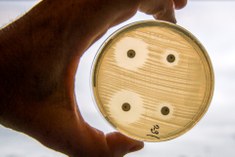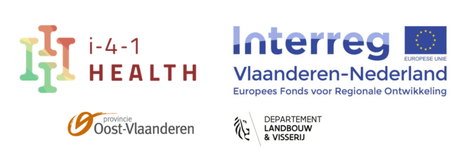Interreg Vlaanderen Nederland - i-4-1-Health
Interreg Vlaanderen-Nederland
Antimicrobial resistance poses one of the most important threats to public and animal health. The i-4-1-Health project is an international research and innovative program between 26 partners of Flanders and The Netherlands, focusing on antimicrobial stewardship and the prevention of infection as well as the spread of resistant genes between animals and man. To achieve the project’s goals, a collaboration between biotechnical sciences, human and veterinary medicine, nanotechnology, microtechnology and agrofood is established. This way, knowledge from different fields of expertise can be pooled and data exchanged. This project aims to control the resistance problem and preserve effective healthcare in the future. Coordinator of the project is Prof. dr. Jan Kluytmans (Amphia) and will run from 1 January 2017 until 31 December 2019.
Description of the project

The region between Flanders and The Netherlands is densely populated and there is a large amount of public traffic as well as traffic of animals and animal products. These factors enhance the risks of resistance spreading. Namely, resistant pathogens can spread through humans, animals, food and the environment. Furthermore, an international collaboration concerning infection prevention and –control in human or animal science has not been established so far. With this project, Flanders and The Netherlands want to act as a role model for other European countries.
The goal of the i-4-1-Health project is to gain more insight in antimicrobial resistance in human medicine and livestock in order to prevent, control and treat the upcoming infections and resistance. The presence and spread of resistant pathogens in patients, healthy citizens and animals needs further investigation. Ghent University will be involved in the project section at livestock farms, in collaboration with the University of Utrecht, The Netherlands. The goal of this subproject is to develop an innovative quality system for infection prevention and antimicrobial stewardship. The animals chosen are pigs and poultry, since intensive exploitation of these livestock is well developed in Flanders and The Netherlands. Furthermore, a high prevalence of antimicrobial resistance was previously found in these animals.

With the preventive methods designed and validated in the project, resistance problems can be kept under control. The improved knowledge and innovations will be available to national organizations and other EU-countries, giving the opportunity for companies to further develop and improve the methods. This way, effective care and safety in human and veterinary medicine can be preserved in the future.
Objectives
These are the objectives of I-4-1-Health:
- Gain insights in the antimicrobial resistance present in the patient/healthy citizen/livestock
- Create an innovative quality system for stewardship and prevention of infection
- To ensure effective and accessible human and veterinary medicine in the future
Role of Ghent University
Ghent University will act as coordinator of “Network building and sharing knowledge of the animal keepers”
Preliminary results from this project will be presented at the 2nd OIE Global Conference on Antimicrobial Resistance and Prudent Use of Antimicrobial Agents in Animals by Nele Caekebeke (Ghent University) on 29-31 October 2018 in Marrakesh, Morocco.
Contact
Prof. dr. Jeroen Dewulf
Veterinary Epidemiology Unit, Faculty of Veterinary Medicine, Ghent University
Phone number: +32 9 264 75 43
E-mail: jeroen.dewulf@ugent.be
